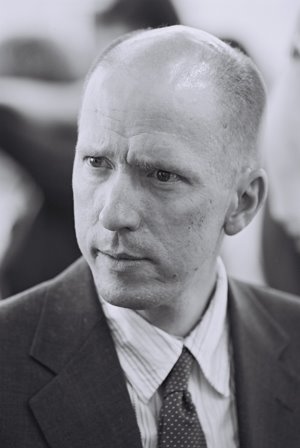I've also been listening to an audiobook of The Big Short by Michael Lewis. The characters are fascinating and you learn a lot too. Though I have to admit that synthetic collateralized debt obligations still confuse me despite Lewis' lucid explanations.
Sunday, July 25, 2010
Planet Money and the Big Short
My July endorsements are both economics/crisis related. Thanks to a tip from Andy Bernard, I started listening to Planet Money, a podcast from NPR. I download it from iTunes. The reporters are excellent. It manages to be very entertaining while not sacrificing substance. I learn something from almost every episode. In the episode I'm listening to now, they track down homes in Sarasota, FL that were part of a "toxic asset" they bought during the crisis. Three of nine houses they found were investment homes. Another was a second home. I'd been expecting it to be poor, unsophisticated people who had lost their jobs and hadn't been able to make interest payments when their low "teaser" rates expired. I'm sure those victims are part of the larger story but it's interesting to hear about the other side.
Tuesday, July 06, 2010
The wisdom of Esther Duflo
I just got around to reading the Ian Parker profile of Esther Duflo in the May 17, 2010 New Yorker. It's worth reading for anyone interested in development policy (which should be most people, I hope). But I found it particularly interesting because of the issues it raises for my profession. What are the central questions that economists are tasked with answering? And how should we answer them?
Here are a couple passages with Duflo quotes that I liked.
Duflo had long wanted to use experimental methods to put microfinance to the test. As she saw it, there was little beyond anecdote to support claims that the technique had a special power to combat poverty, gender inequality, and ill health. This is not to say that Duflo was committed to debunking. "One of my great assets of being in this business, or maybe I've developed it over time, is I don't have many opinions to start with," she told me. "I have one opinion--one should evaluate things--which is strongly held. I'm never unhappy with the results. I haven't yet seen a result a didn't like."
I like this attitude a lot but I often feel the opposite. There's no such thing as a likable result. Our referees at journals tell us "There is nothing surprising in this paper. Your results are obvious." Or they tell us "I don't believe your results at all. They are all spurious." It would seem that Duflo has a talent for designing questions where the results will be plausible and surprising, if only in the sense that no one knew what to expect.
There is an interesting debate over whether economists need to understand the mechanisms at work or whether it is enough simply to find out whether various "treatments" actually work. I think we were probably too much on the mechanism side. We had our theory telling us what to expect via mechanisms such as supply, demand, equilibrium, expected utility maximization, etc. And then as long as we had a supportive anecdote, or a strong introspective intuition, or maybe some observational data consistent with the mechanism we became overly confident that we really understood how the world worked enough to prescribe policies.
"It can't only be the data," Duflo said, showing a rare willingness to generalize. "Even to understand what data means, and what data I need, I need to form an intuition about things. and that process is as ad hoc and impressionistic as anybody's."It can't only be the data, but there must be data. "There is a lot of noise in the world," Duflo said. "And there is a lot of idiosyncrasy. But there are also regularities and phenomena. And what the data is going to be able to do--if there's enough of it--is uncover, in the mess and the noise of the world, some lines of music that actually have harmony. It's there, somewhere."
That's a gorgeous expression of an inspiring thought. But don't worry I'm not going to abandon my office and take to the field, running randomized experiments. I am very glad economics has made room for and even celebrates (Clark medal) this sort of work. But I have been brought up to believe that the data is given and it is our job to find the data,, assemble it, clean it, massage it, scrutinize it, and finally interpret it (via econometrics). Nothing in my education, experience or natural aptitudes has prepared me to go out and create the data.
Subscribe to:
Comments (Atom)
